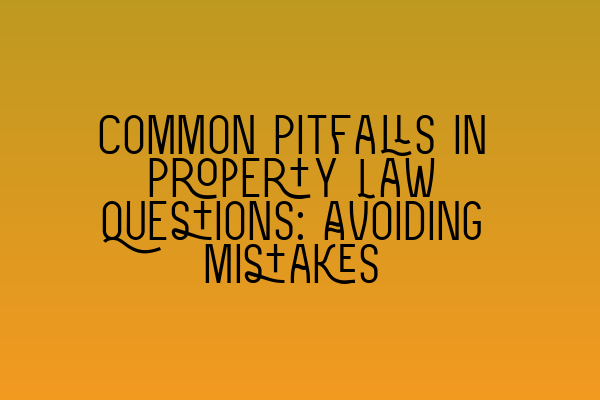Common Pitfalls in Property Law Questions: Avoiding Mistakes
As a property law solicitor, I understand the complexity and nuances involved in this area of the law. It’s not uncommon for individuals to face challenges and make mistakes when it comes to property law questions. In this blog post, I will highlight some common pitfalls to avoid, helping you navigate property law with greater confidence.
1. Failure to Understand Legal Terminology
Property law involves a wide range of legal terms and concepts that can be confusing for individuals who are unfamiliar with the field. One of the main pitfalls is failing to understand the meaning and significance of these terms.
To overcome this challenge, it’s crucial to study and familiarize yourself with the key property law terminology. This will not only help you answer questions accurately but also give you a solid foundation in this area of law.
2. Misinterpretation of Statutes
In property law, statutes play a crucial role in shaping the legal framework. However, misinterpretation of these statutes is a common pitfall. It’s important to carefully analyze and understand the language, context, and purpose of relevant statutes to provide accurate answers.
Make sure to stay up-to-date with any amendments or new legislation that may impact property law. This will ensure you are equipped with the most current information when tackling property law questions.
3. Inadequate Knowledge of Case Law
Case law is an essential aspect of property law. It provides precedent and guidance for interpreting and applying the law to specific situations. Failing to research and include relevant case law in your answers can result in incomplete or inaccurate responses.
To avoid this pitfall, take the time to read and understand key property law cases. Analyze how courts have interpreted and applied the law in different scenarios. This will enhance your understanding and prepare you to answer questions effectively.
4. Overlooking Land Registration Requirements
Land registration is a fundamental aspect of property law, and overlooking its requirements can lead to mistakes. It’s essential to understand the process of land registration in your jurisdiction and be aware of any specific formalities or safeguards that must be followed.
Additionally, be mindful of the different types of land ownership and their associated rights and responsibilities. This knowledge will enable you to accurately address questions related to land registration.
5. Insufficient Application of Legal Principles
In property law questions, it’s not enough to simply recite legal principles. The key is to apply these principles to the specific facts of the case at hand. Insufficient application of legal principles is a common mistake that can lead to incorrect answers.
Developing the skill of applying legal principles requires practice. Consider taking SQE 1 Practice Exam Questions and SQE 1 Practice Mocks FLK1 FLK2 to enhance your ability to analyze scenarios and apply property law principles effectively. These resources will help you identify the relevant legal issues and formulate well-reasoned answers.
Conclusion
Property law questions can be challenging, but with adequate preparation and attentiveness to potential pitfalls, you can avoid making mistakes. Understanding legal terminology, interpreting statutes correctly, researching and including relevant case law, adhering to land registration requirements, and applying legal principles are all crucial elements in answering property law questions accurately.
Continue your property law learning journey by exploring our SQE 2 Preparation Courses and SQE 1 Preparation Courses. Stay updated on upcoming SRA SQE Exam Dates to plan your study schedule effectively.
